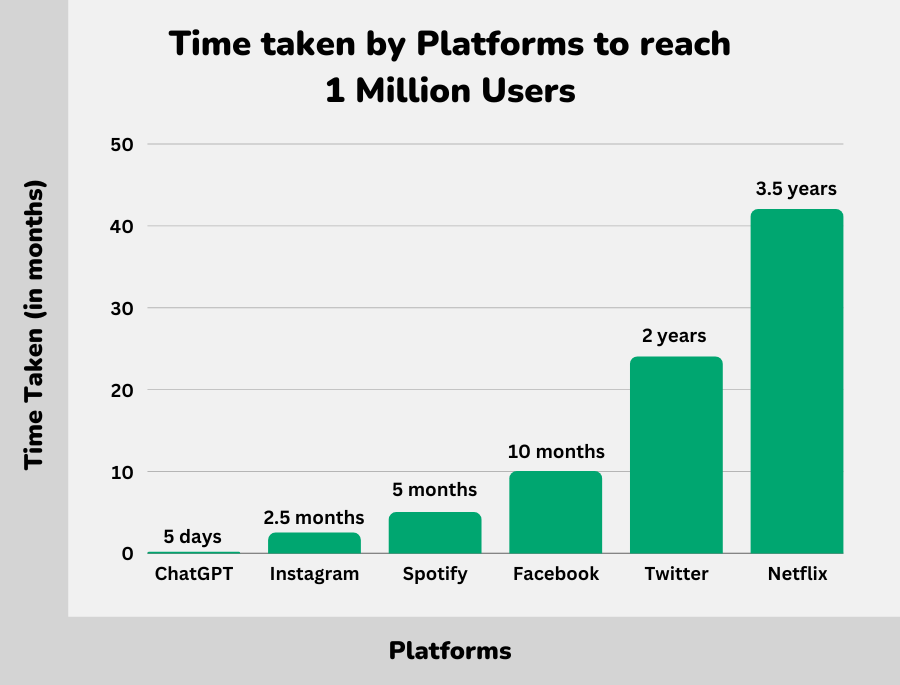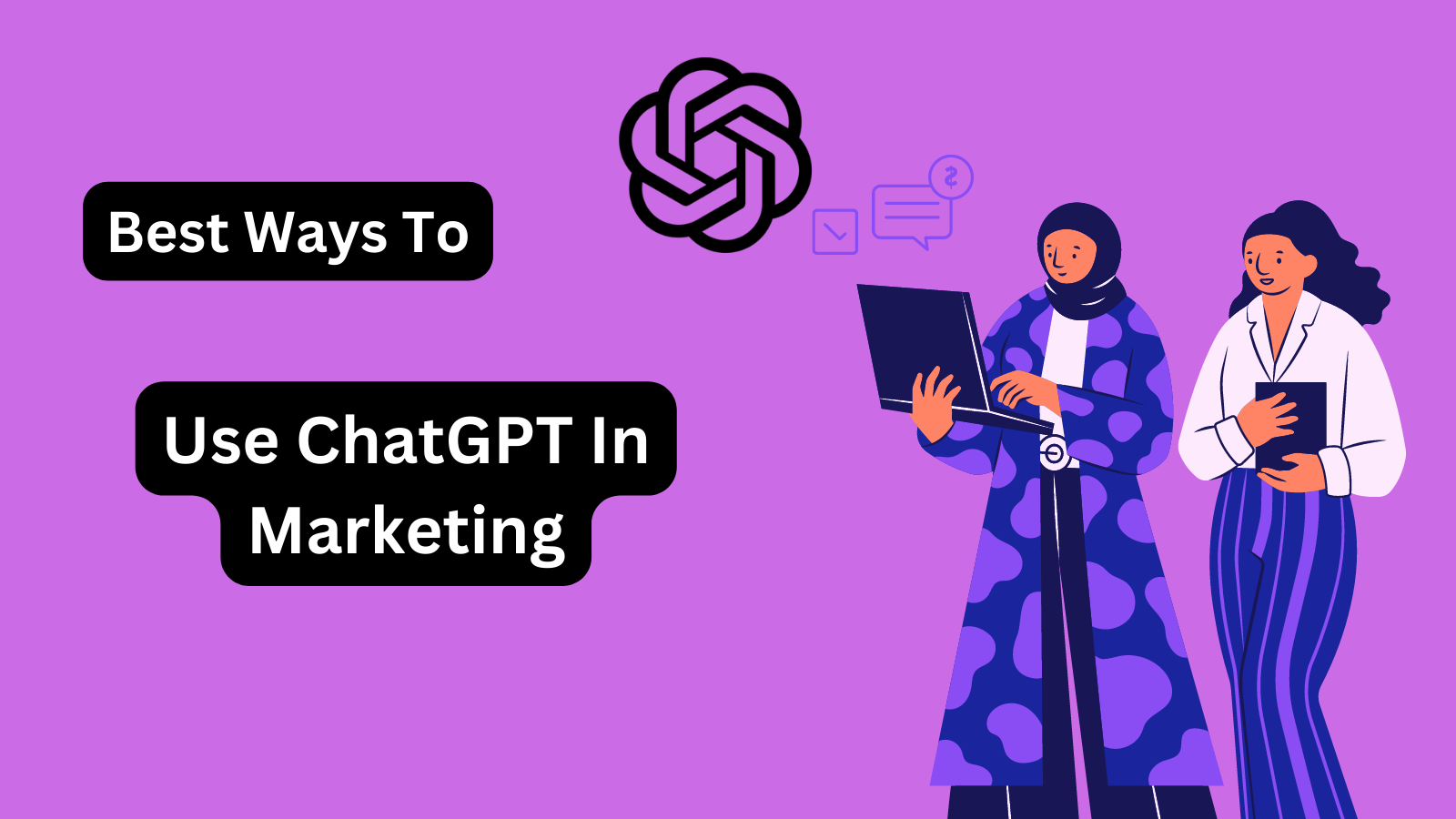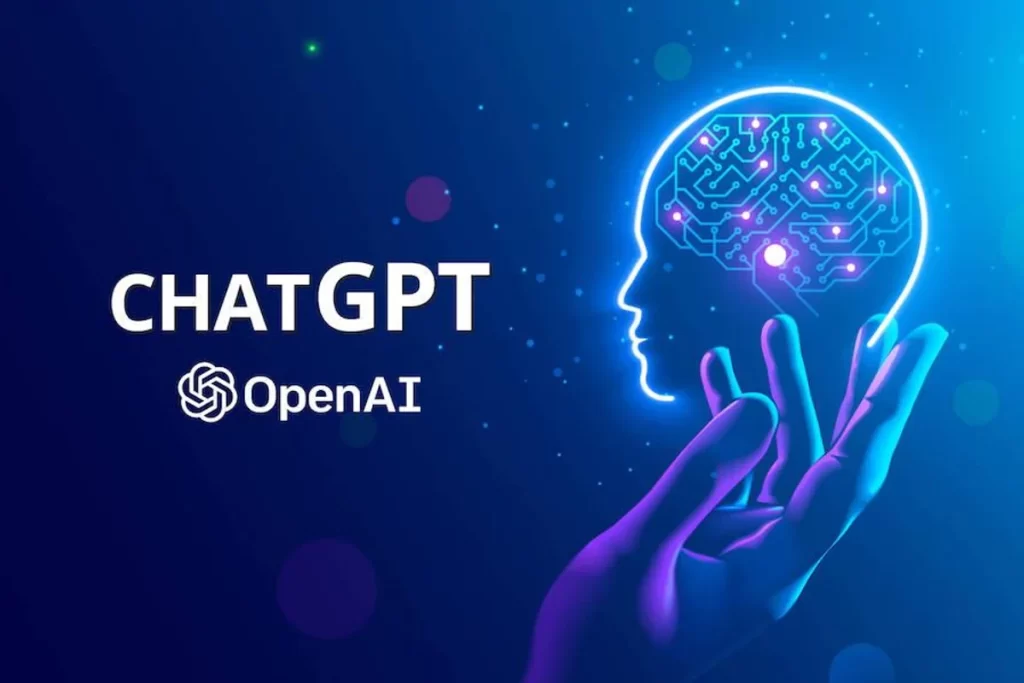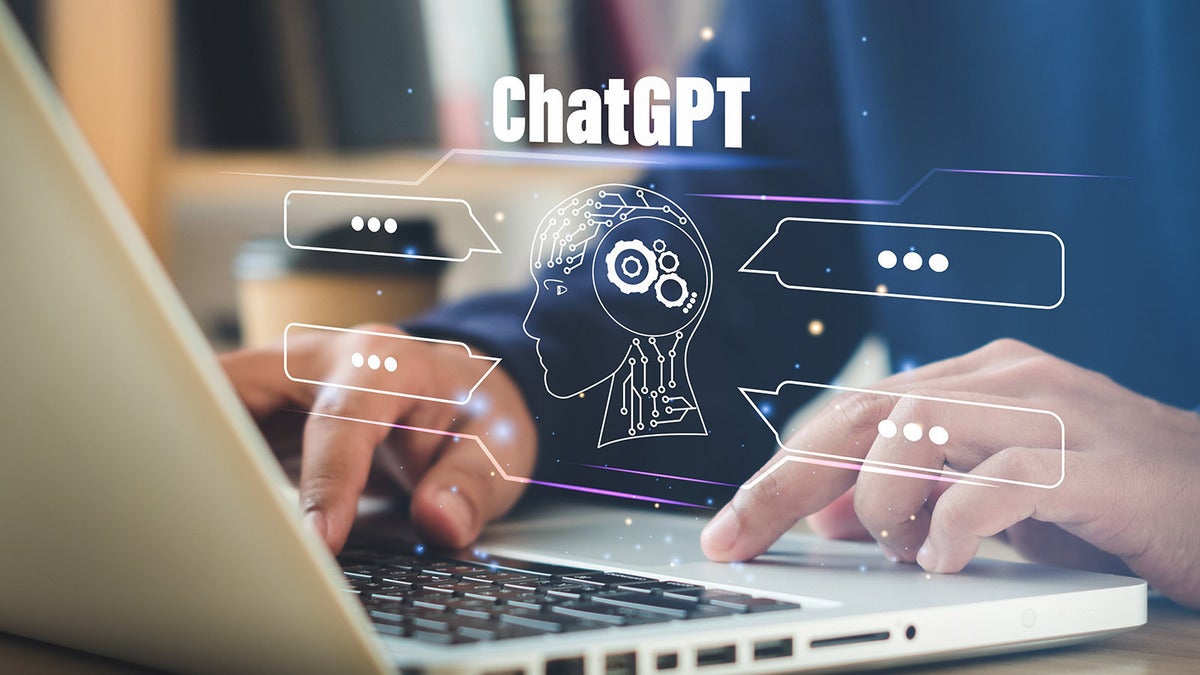Tech
7 Best Ways To Use ChatGPT Artificial Intelligence in Marketing

Technology and Artificial Intelligence (AI) have had a significant impact on almost every sector. AI is here to stay, and its growth is inevitable.In 2022, OpenAI, an AI research and development company, launched ChatGPT, a popular tool that gained 1 million active monthly users in just five days of its launch.
Some big tech companies in the world took too long to achieve their 1st million users like Facebook took 10 months, Twitter took 2 years and Netflix took 3.5 years. Check this ChatGPT stat on user comparison infographic below by DiscoverTheTech.

Source- Discoverthetech.com
ChatGPT is an exception and became the world’s fastest-growing consumer application.
It offers many features and can benefit various industries, including marketing and advertising.
It’s the perfect time for organizations to stay updated with the tool’s abilities and leverage ChatGPT for their business.
Here are seven ways in which businesses can use ChatGPT in marketing:

1. Content Creation
ChatGPT generates engaging content in seconds, 5x faster than a full-time copywriter.
To use ChatGPT for content creation, you would provide it with a prompt or topic and let it generate a response.
You can then fine-tune the model to generate specific types of content or adopt a specific writing style by providing it with more targeted training data.
While ChatGPT can produce high-quality content but copying and pasting articles from ChatGPT can be detected with AI detection tools, potentially ruining the business’s reputation and hurting search engine rankings.
So, it is important to note that it is not a substitute for human writers.
It is best used as a tool to augment the writing process, providing inspiration and generating ideas that can be further developed by a human writer.
Creative teams use ChatGPT to streamline their brainstorming and copywriting process and produce unique content quickly.
Check this post on the best AI content generation softwares to automate your content writing work with ease and more accuracy.
2. Lead Generation
ChatGPT can carry out interactive text-based communication to problem-solve with website visitors, collecting helpful information for lead generation and nurturing.
ChatGPT in marketing enables users to engage with websites and offer valuable segmentation information.
To use ChatGPT for lead generation and networking, you can create a chatbot that engages with visitors on your website or social media platforms.
The chatbot can ask questions and collect information from potential leads, such as their name, email address, and what products or services they’re interested in.
You can also use ChatGPT to personalize the conversation and provide relevant information to the lead based on their responses.
By using ChatGPT to create a personalized and engaging experience, you can increase the chances of converting visitors into leads.

3. Improve Customer Service Quality
AI-based ChatGPT enhances the efficiency of chatbots, delivering more efficient responses that improve the customer experience. Improving customer service via ChatGPT can help marketers understand and address customer issues.
To improve customer service quality using ChatGPT, you can integrate it into your chatbot or customer service platform to provide automated responses to common queries, offer personalized recommendations, and help customers navigate your products or services.
You can also train ChatGPT to identify and escalate complex issues to a human representative and use its natural language processing capabilities to gather feedback and insights from customer interactions to continuously improve your service.
4. Research and Analysis
ChatGPT is an excellent tool for studying various subjects, including market trends and strategies, getting recommendations and competitor services, and other critical business information. However, businesses should confirm the information gathered by ChatGPT as it relies on the internet as a data source, which could create inaccurate results.
To use ChatGPT for research and analysis, you can input your research question or topic and let ChatGPT generate relevant information and insights based on its vast knowledge database.
You can also provide additional context or constraints to help guide the output. Once you receive the generated text, you can analyze and extract the relevant information for your research purposes.
Additionally, you can use ChatGPT to automate certain research tasks such as data collection, analysis, and synthesis.

5. Onboarding and Training
Using ChatGPT for onboarding and training can be a useful tool for organizations.
It allows for the creation of interactive and personalized training materials that can adapt to the individual learning needs of job seekers.
This can lead to more effective training outcomes and help employees to better understand and retain information.
ChatGPT can be used to create a variety of training materials, such as video tutorials, interactive simulations, and quizzes.
These can be tailored to specific roles within the organization, ensuring that employees receive the relevant information they need to perform their job duties effectively.
Additionally, ChatGPT can be integrated with other onboarding and training tools, such as learning management systems (LMS).
This can allow for a seamless onboarding and training process, where employees can access all the necessary materials in one place.
Furthermore, ChatGPT can be used to provide ongoing support and training to employees even after the initial onboarding and training process is complete.
This can be especially useful for complex tasks or procedures, where employees may need to refer back to training materials on an ongoing basis.
Overall, using ChatGPT for onboarding and training can help organizations to improve their employee onboarding and training processes, resulting in more knowledgeable and capable employees.
6. Social Media Management
ChatGPT can help with social media management by generating content ideas, scheduling posts, and engaging with followers.
It can also monitor social media platforms for mentions of a brand or product, providing valuable insights for the business.
To begin, the ChatGPT can be trained on a brand’s voice and tone, so it can generate content ideas that are on-brand and consistent.
The AI model can also help schedule posts in advance, ensuring a consistent social media presence.
Additionally, ChatGPT can respond to common customer inquiries and comments, reducing response time and improving customer satisfaction.
ChatGPT can also be used for social media listening, monitoring social media platforms for brand mentions, and identifying trends and patterns in customer feedback.
This can help businesses stay on top of customer sentiment and quickly respond to any issues or concerns.
Overall, using ChatGPT for social media management can save time, improve efficiency, and provide valuable insights for businesses to improve their social media strategy and better engage with their audience.
7. Market Research
ChatGPT can streamline the process of market research by conducting questionnaires and surveys to collect insights from demographic data, analyzing customer feedback, and producing a thorough report that helps marketers discern customer preferences and opinions.
By interacting with customers through chat conversations, ChatGPT can gather valuable insights into products and services.
This can be achieved by programming ChatGPT with questions relevant to the business and its target market.
Additionally, ChatGPT can be used to analyze customer feedback and reviews, identifying common themes and sentiments expressed by customers. This information can be used to improve products and services, as well as identifying areas where the company is excelling.
Furthermore, by monitoring social media conversations, ChatGPT can identify trends and patterns related to the business.
By analyzing the data collected from these conversations, businesses can better understand how customers are talking about their products and services, and identify areas for improvement.
Conclusion
In conclusion, ChatGPT can be an incredibly valuable tool in marketing.
You can even make ChatGPT more efficient by using ChatGPT extensions that will further help to use ChatGPT more easily.
By engaging with customers and analyzing their feedback, ChatGPT can provide businesses with valuable insights that can help them improve their products and services, as well as better understand their customers’ needs and preferences.
ChatGPT can be used to ask targeted questions, analyze customer feedback and reviews, and monitor social media conversations to identify trends and patterns.
By using ChatGPT for market research, businesses can gain a competitive edge and make data-driven decisions that improve customer satisfaction and loyalty.
With its ability to process vast amounts of data quickly and efficiently, ChatGPT is a powerful marketing tool that can help businesses stay ahead of the curve and adapt to changing market conditions.

Tech
US: A Judge Mandates that Google Allow Competing App Stores to Access Android

(VOR News) – The ruling is that Google, the greatest technology firm in the world, is required to make its Android smartphone operating system available to merchants that supply applications that are in direct rivalry with Google’s. This decision was reached by a judge in the United States of America.
The Android Play store, which is owned and operated by Google, was found to be an example of an illegal monopoly arrangement by a jury in the state of California on Monday. The finding was reached by a jury. Monday is the day that this decision was come to.
An earlier federal judge ruled Google’s search engine illegal.
This finding, which came after that decision, has forced the company to suffer yet another setback. As a result of the corporation having already encountered its initial obstacle, this decision has been established. This particular decision was made by the judge during the month of August, when the month was in progress.
In light of the fact that the decision was made, what exactly does it mean that the choice was accepted?
In accordance with the verdict, Google is obligated to make it possible for users to download Android app stores that are offered by third-party competitors. For a period of three years, the corporation is prohibited from imposing restrictions on the usage of payment mechanisms that are integrated into the application.
In addition, it is important to keep in mind that Google does not possess the right to impose restrictions on the utilization of ways to make payments online.
Additionally, the verdict makes it unlawful for Google to give money to manufacturers of smartphones in order to preinstall its app store. Smartphone manufacturers are prohibited from doing so.
Furthermore, it prevents Google from the possibility of sharing the revenue that is generated by the Play store with other companies that are in the industry of delivering mobile applications.
In addition to this, the court has mandated the establishment of a technical committee that will be made up of three different people chosen at random.
The committee will be responsible for monitoring the implementation of the reforms and finding solutions to any disagreements that may occur as a consequence of the implementation of the reforms while they are being implemented. This task will fall under the committee’s purview so that it may fulfill its duties.
However, certain components were allowed to be put into action until July 1st, despite the fact that the judge’s statement suggested that the ruling would take effect on November 1st. The statement was the basis for the ruling, which ultimately became effective.
Particularly, I wanted to know what Google’s reaction would be.
There is a fact that Google does not adhere to this directive, which has been brought to their attention. This document argued that the alterations that the judge had ordered to be made would “cause a range of unintended consequences that will harm American consumers, developers, and device makers.”
The judge had ordered the modifications to be implemented. The alterations were to be carried out as indicated by the judge’s ruling. The judge made it clear that he expected these revisions to be carried out in accordance with his guidance.
The company’s regulatory affairs vice president, Lee-Anne Mulholland, provided the following statement: “We look forward to continuing to make our case on appeal, and we will continue to advocate for what is best for developers, device manufacturers, and the billions of Android users around the world.”
On average, over seventy percent of the total market for smartphones and other mobile devices is comprised of mobile devices that are powered by the Android operating system. Both smartphones and other small mobile devices are included in this category.
In the event that the Play app store continues to be shown on the home page and that other Google applications are pre-installed prior to the installation of the Android application, smartphone manufacturers are entitled to install the Android application at no cost at their discretion.
Additionally, the Android application can be installed on devices that are manufactured for smartphones.
SOURCE: DWN
SEE ALSO:
Over The Planned “Link Tax” Bill, Google Threatens to Remove NZ News Links.
Tech
WhatsApp Now Features a “Mention” Tool for Status Updates and Stories.

(VOR News) – Those who use WhatsApp now have the ability to mention other people in their stories or status updates as a consequence of a feature that was only recently enabled on the platform.
Previous to this point, this capability was not available. It wasn’t until quite recently that this capability became available to the public.
According to the information that was provided by the company, users now have the opportunity to tag close friends in their stories, and the person who is mentioned will have the option to go back and re-share an earlier version of that story. This information was provided by the company. The corporation was kind enough to reveal this information to us.
Because of a new feature that has been added to the WhatsApp app, users now have the opportunity to like individual stories and status updates.
This capability was previously unavailable to WhatsApp users.
A significant amount of progress has been made in this context. Alternative readers now have the chance to “like” a work, which is comparable to liking a post on Facebook. This feature was introduced in recent years. When compared to the past, this is a tremendous shift.
At one point in time, viewers were only permitted to observe the total number of views that a particular story had gotten. These restrictions were eliminated in later versions of the software.
Additionally, it is essential that the likes and reactions to a story be kept anonymous during the entire process. One of the factors that contributes to the general mystery that surrounds this characteristic is the fact that this is one of the elements.
The person who brought it to the attention of others is the only person who will be able to judge who enjoyed it and who did not care about it. These individuals will be able to make this determination.
A notification will be issued to the individual who was referenced earlier in the sentence and who was named in the story or status update that was discussed. A notification of this nature will be sent to the individual via WhatsApp.
This message will be sent to the user in question whenever that person makes a reference to another person while they are in the process of elaborating on a narrative or updating their status. You will receive a notification alerting you that you have been tagged in the narrative.
This notification will be delivered to the person who receives this message. In addition, students will be provided with the opportunity to re-share the tale for themselves.
It is important to note that if the names of individuals who have been referenced in a narrative or a status update are included in any of these, then the names of those individuals will not be accessible to any third party through any of these. In light of the fact that the identities of those individuals will be concealed from public disclosure, this is the condition that will be required.
While WhatsApp recently made the announcement that it will be incorporating this functionality, it is highly likely that not all users will have access to it at the same time.
This is despite the fact that WhatsApp recently made this announcement.
Despite the fact that WhatsApp has only recently made a public announcement that it will move forward with the deployment, this is the situation that has presented itself.
As soon as a short period of time has elapsed, access will be made available to each and every person on the entire world.
Additionally, WhatsApp has hinted that new functionalities might be introduced to the status and updates tab in the future months.
The purpose of these capabilities is to provide users with assistance in maintaining healthy connections with the individuals who play a vital role in their living experiences. This is done in order to give users with support in maintaining close relationships with the folks who are the subject of the inquiry.
It is with the purpose of supporting users in successfully keeping close ties with the individuals in question that this step is taken.
SOURCE: DN
SEE ALSO:
Over The Planned “Link Tax” Bill, Google Threatens to Remove NZ News Links.
Accenture and NVIDIA Collaborate to Enhance AI Implementation.
Tech
Over The Planned “Link Tax” Bill, Google Threatens to Remove NZ News Links.

(VOR News) – Google has sent a strong message to the New Zealand government, threatening to stop boosting local news content should the Fair Digital News Bargaining Bill become law.
The law, put up by the Labour government and backed by the coalition in power at the moment, mandates that digital companies such as Google pay back news organizations for links to their material.
News publishers, on the other hand, charge the tech giant with “corporate bullying.”
Google says this measure may have unanticipated effects.
Google New Zealand’s country director, Caroline Rainsford, voiced her worries that the law, which is being referred to as a “link tax,” is not doing enough to support the media industry in New Zealand right now.
She underlined that Google would have to make major adjustments if the previously mentioned law were to pass, including cutting off links to news articles from its Search, News, and Discover platforms and cutting off financial ties with regional publications.
According to Rainsford, similar legislation has been proposed and approved in other nations including Australia and Canada, but it has not been proven to be effective there and breaches the principles of the open web.
She drew attention to the fact that smaller media outlets will be most negatively impacted, which will limit their capacity to reach prospective audiences.
Google says its alternative options will protect smaller, local media from negative effects.
Conversely, it conveys apprehension regarding the possible fiscal obligations and vagueness of the legislation, which it feels generates an intolerable level of ambiguity for enterprises functioning within New Zealand.
The New Zealand News Publishers Association (NPA) has reacted to Google’s warnings by alleging that the internet behemoth is using coercive tactics.
They specifically contend that the need for regulation stems from the market distortion that Google and other tech giants have created, which has fueled their expansion into some of the most significant corporations in global history.
The legislation aims to create a more equal framework that media businesses can use to negotiate commercial relationships with technological platforms that profit from their content.
New Zealand Media Editors CEO Michael Boggs stated that he was in favor of the bill, citing the fact that Google now makes a substantial profit from material created by regional publications.
He also emphasized that the use of artificial intelligence by Google—which frequently makes references to news articles without giving credit to the original sources—highlights the significance of enacting legislation.
Paul Goldsmith, the Minister of Media and Communications, has stated that the government is now evaluating various viewpoints and is still in the consultation phase.
He stated that the government and Google have been having continuous talks and will keep up these ongoing discussions.
However, not all political parties accept the validity of the Act.
The ACT Party’s leader, David Seymour, has voiced his displeasure of the proposal, saying that Google is a game the government is “playing chicken” with. He threatened the smaller media companies, saying that they would suffer from worse search engine rankings if the internet giant followed through on its promises.
Seymour contended that it is not the government’s responsibility to shield companies from shifts in the market brought about by consumer preferences.
The things that have happened in other nations are similar to what has happened in New Zealand.
Google has agreements with a number of Australian media firms that are in compliance with its News Media Bargaining Code. These agreements contain provisions that permit an annual cancellation of these agreements.
Due to the government’s decision to exempt Google from the Online News Act, the company has committed to supporting news dissemination by contributing annually to the Canadian journalistic community.
The New Zealand measure is consistent with global approaches aimed at regulating the relationships that exist between technology corporations and media organizations.
It’s hard to say what will happen with the Fair Digital News Bargaining Bill as the discussion goes on. Google and the New Zealand media landscape are preparing for what might be a protracted legal battle.
SOURCE: TET
SEE ALSO:
Accenture and NVIDIA Collaborate to Enhance AI Implementation.
-

 News3 years ago
News3 years agoLet’s Know About Ultra High Net Worth Individual
-
Entertainment2 years ago
Mabelle Prior: The Voice of Hope, Resilience, and Diversity Inspiring Generations
-

 Health3 years ago
Health3 years agoHow Much Ivermectin Should You Take?
-

 Tech2 years ago
Tech2 years agoTop Forex Brokers of 2023: Reviews and Analysis for Successful Trading
-

 Lifestyles3 years ago
Lifestyles3 years agoAries Soulmate Signs
-

 Movies2 years ago
Movies2 years agoWhat Should I Do If Disney Plus Keeps Logging Me Out of TV?
-

 Health3 years ago
Health3 years agoCan I Buy Ivermectin Without A Prescription in the USA?
-

 Learning2 years ago
Learning2 years agoVirtual Numbers: What Are They For?